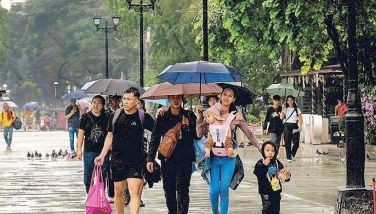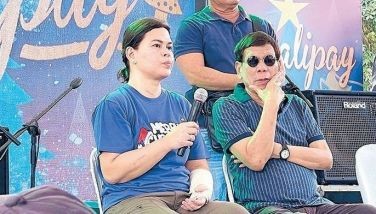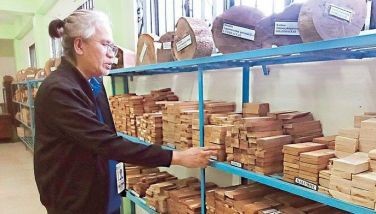Police turn to ‘bible’ of procedures for hostage dramas
March 29, 2007 | 12:00am
If you go by the book, will the ending be predictable?
Philippine National Police (PNP) manual "Police Operational Procedure" details the proper procedures for dealing with hostage situations. The POP manual is considered the bible of law enforcers who need to deal with all kinds of crisis situations.
Dealing with a hostage situation is under the POP Rule 22, which has nine sections, the first of which talks about "the procedures to be followed in a hostage situation."
Under this procedure, the first thing to do is to immediately activate a crisis management task group, after which the crisis area is to be secured and isolated.
The procedure states that unauthorized persons shall not be allowed ingress to or egress from the area – a procedure apparently violated by Sen. Ramon "Bong" Revilla Jr. in yesterday’s hostage drama, who entered the bus and talked with hostage-taker Engineer Armando Ducat Jr.
The POP also indicated that witnesses’ names, addresses and other information should be recorded and that witnesses must be directed to a safe location.
"There shall be only one ground commander in the area," the POP states. "Negotiators shall be designated by a ground commander. No one shall be allowed to talk to the hostage-taker without clearance from the negotiating panel or ground commander."
During a radio interview, Metro Manila Police chief Deputy Director General Reynaldo Varilla said Revilla violated this standard operational procedure (SOP) when he entered the bus to talk with Ducat.
The manual further says that, in the conduct of negotiations the authorities must stabilize and contain the situation, select the right time to make contact with the hostage-taker and take their time when negotiating.
"Allow the hostage-taker to speak," is one of the POP procedures that enabled Ducat to speak for over 10 minutes in a spiel aired over radio stations and television networks.
Ducat took this time to call on the public to vote for candidates with good reputations and lambast politicians for their alleged corruption.
He also, apparently, sided with President Arroyo when he said in Tagalog that "the President cannot do it alone. Everyone must do his part."
The police procedures also state that a "negotiator must not offer the hostage-taker anything. What he will ask for will be part of the negotiation."
Negotiators must "avoid directing frequent attention to the victim when talking to the hostage-taker; Don’t call them hostages. Be as honest as possible; avoid tricks, be sincere," the POP states.
The POP also states that "negotiators must never dismiss any request from the hostage-taker as trivial and unimportant. Never say no."
The other POP procedures include the following: "Soften the demands; Never set a deadline; try not to accept a deadline and Do not make alternative suggestions not agreed upon in the negotiations."
The POP also clearly states that negotiators are not to "introduce outsiders (non-law enforcement officers) into the negotiation process, unless their presence is extremely necessary in the solution of the crisis; provided that they should be properly advised on the do’s and dont’s of hostage negotiations."
The POP also states that any exchange of hostages should not be allowed unless extremely necessary and that police negotiators are not to exchange a negotiator for a hostage.
According to these rules, negotiators must "avoid negotiating face-to-face" – a rule violated again by Revilla when he entered the bus to speak with Ducat.
The POP rules also said that "even law enforcement officers without proper training shall not be allowed to participate in the hostage negotiations."
Under the POP’s Section 4, an assault team should be alerted for deployment in case the negotiation fails: "Members of the assault team shall wear authorized and easily recognizable uniform during the conduct of the operation. Bonnets shall not be used."
POP Section 5 indicates that any assault shall be planned to ensure minimal threat to the lives of all parties involved in the situation, while Section 6 states that ambulances with medical crews and a firetruck must be detailed at the crisis area.
POP Section 7 states that proper coordination among all participating elements must be done to consolidate efforts to resolve the crisis.
Finally, the POP stresses that, "in negotiating for the release of a hostage, the safety of the hostage shall always be paramount."
Philippine National Police (PNP) manual "Police Operational Procedure" details the proper procedures for dealing with hostage situations. The POP manual is considered the bible of law enforcers who need to deal with all kinds of crisis situations.
Dealing with a hostage situation is under the POP Rule 22, which has nine sections, the first of which talks about "the procedures to be followed in a hostage situation."
Under this procedure, the first thing to do is to immediately activate a crisis management task group, after which the crisis area is to be secured and isolated.
The procedure states that unauthorized persons shall not be allowed ingress to or egress from the area – a procedure apparently violated by Sen. Ramon "Bong" Revilla Jr. in yesterday’s hostage drama, who entered the bus and talked with hostage-taker Engineer Armando Ducat Jr.
The POP also indicated that witnesses’ names, addresses and other information should be recorded and that witnesses must be directed to a safe location.
"There shall be only one ground commander in the area," the POP states. "Negotiators shall be designated by a ground commander. No one shall be allowed to talk to the hostage-taker without clearance from the negotiating panel or ground commander."
During a radio interview, Metro Manila Police chief Deputy Director General Reynaldo Varilla said Revilla violated this standard operational procedure (SOP) when he entered the bus to talk with Ducat.
The manual further says that, in the conduct of negotiations the authorities must stabilize and contain the situation, select the right time to make contact with the hostage-taker and take their time when negotiating.
"Allow the hostage-taker to speak," is one of the POP procedures that enabled Ducat to speak for over 10 minutes in a spiel aired over radio stations and television networks.
Ducat took this time to call on the public to vote for candidates with good reputations and lambast politicians for their alleged corruption.
He also, apparently, sided with President Arroyo when he said in Tagalog that "the President cannot do it alone. Everyone must do his part."
The police procedures also state that a "negotiator must not offer the hostage-taker anything. What he will ask for will be part of the negotiation."
Negotiators must "avoid directing frequent attention to the victim when talking to the hostage-taker; Don’t call them hostages. Be as honest as possible; avoid tricks, be sincere," the POP states.
The POP also states that "negotiators must never dismiss any request from the hostage-taker as trivial and unimportant. Never say no."
The other POP procedures include the following: "Soften the demands; Never set a deadline; try not to accept a deadline and Do not make alternative suggestions not agreed upon in the negotiations."
The POP also clearly states that negotiators are not to "introduce outsiders (non-law enforcement officers) into the negotiation process, unless their presence is extremely necessary in the solution of the crisis; provided that they should be properly advised on the do’s and dont’s of hostage negotiations."
The POP also states that any exchange of hostages should not be allowed unless extremely necessary and that police negotiators are not to exchange a negotiator for a hostage.
According to these rules, negotiators must "avoid negotiating face-to-face" – a rule violated again by Revilla when he entered the bus to speak with Ducat.
The POP rules also said that "even law enforcement officers without proper training shall not be allowed to participate in the hostage negotiations."
Under the POP’s Section 4, an assault team should be alerted for deployment in case the negotiation fails: "Members of the assault team shall wear authorized and easily recognizable uniform during the conduct of the operation. Bonnets shall not be used."
POP Section 5 indicates that any assault shall be planned to ensure minimal threat to the lives of all parties involved in the situation, while Section 6 states that ambulances with medical crews and a firetruck must be detailed at the crisis area.
POP Section 7 states that proper coordination among all participating elements must be done to consolidate efforts to resolve the crisis.
Finally, the POP stresses that, "in negotiating for the release of a hostage, the safety of the hostage shall always be paramount."
BrandSpace Articles
<
>
- Latest
- Trending
Trending
Latest
Trending
Latest
Recommended




























